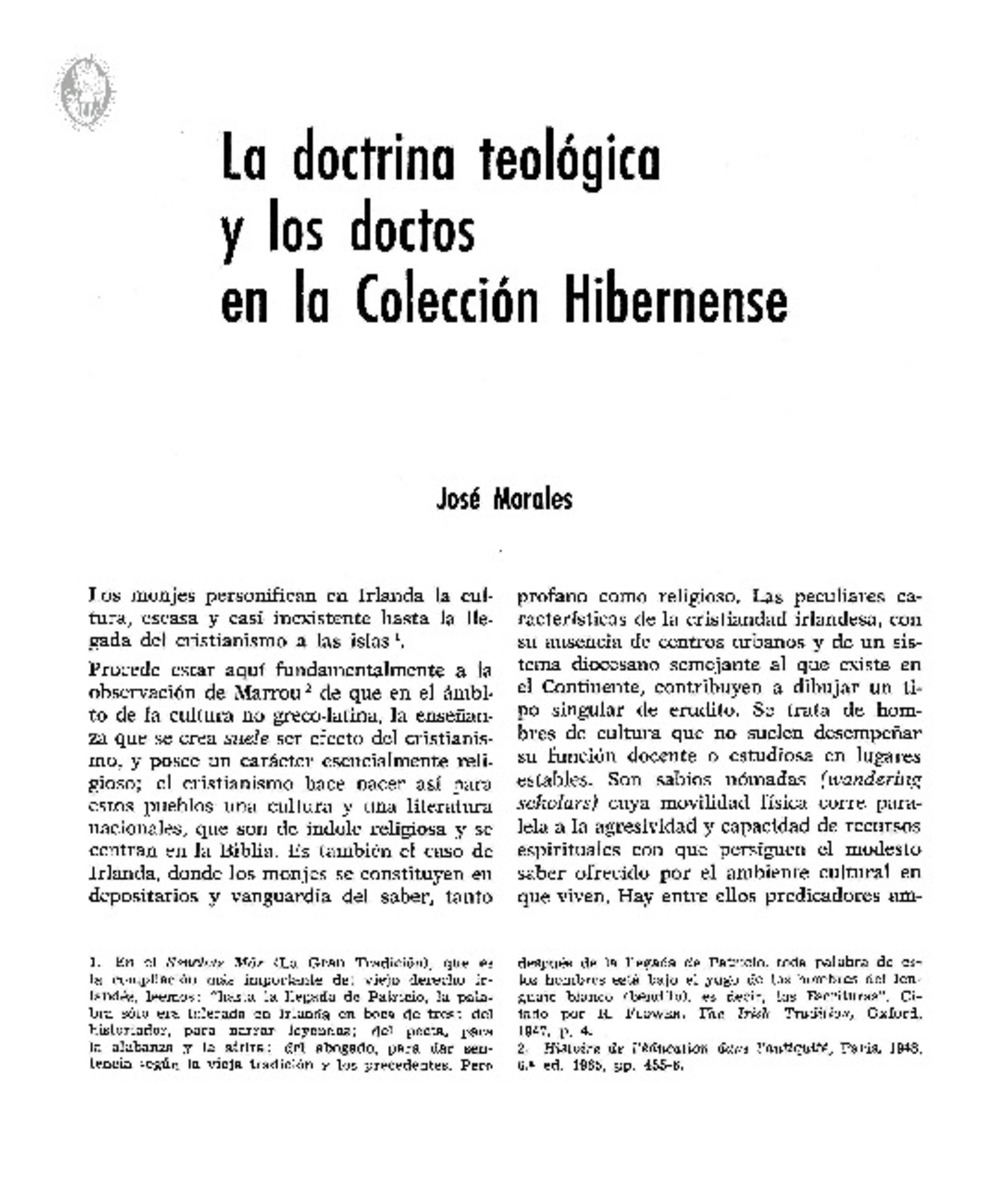Full metadata record
| DC Field | Value | Language |
|---|---|---|
| dc.creator | Morales, J. (José) | |
| dc.date.accessioned | 2010-12-23T13:41:37Z | - |
| dc.date.available | 2010-12-23T13:41:37Z | - |
| dc.date.issued | 1972 | - |
| dc.identifier.citation | IUS CANONICUM, XII, N.II, 1972, pág. 281-286 | es_ES |
| dc.identifier.issn | 0021-325X | - |
| dc.identifier.uri | https://hdl.handle.net/10171/15020 | - |
| dc.description.abstract | SUMMARIUM Canones Hibernienses, saeculi VIII, rarae sunt collections canonicae quae librum integrum decem novem capitulorum christianis in Ecclesia res magisterii agentibus dedicant. Figura «Doctoris», fungens in societate Christiana munus veteris «Didascali», contemplatur collectionis auctoribus sub notione augustiniana, i. e., defensor studii et culturaereligiosae profanaeque tanquam elementa neccesaria ad fidem discendam atque augendam. Ceterum, collectio testatur statum ac momentum historiae in quibus Ecclesia chrlstianis cultis per eorum rectores disciplinae poscit usum vlgilantiae et prudentis iudicii in eorum laborioso studio de fidei deposito atque in docendo populo christiano. Irlanda insula non solum est sanctorum, verum etiam paradisus doctis qui caeteris christianis docere possunt magna ex parte ad prudentem arbitrium propium, pro re et iussu ecclesiasticae-religiosae sociologiae.--------------------------------- ABSTRAeT The «Canones Hibernenses», of the 8th century, ls one of the rare canonical collections which dedicates a complete book -of 19 chapters- to those Christians who fulfill a magisterial activity in the Church. The authors of the Collection contemplate the figure of the Doctor, who continues the catechetical function of the ancient Didascalos in the heart of the Christian community, from the point of view of the Ailgustinian ideal; that is to say, an ideal which defends the role of study and of culture -both religious and profane- as being necessary elements for gaining a deeper knowledge and development of the faith. On the other hand, the collection bears witness to a particular period and historical situation in which the Church asks the cultured Christians, through the .voice of those responsible for their discipline and government, to exercise self-control and prudent discretion in their studious investigation of the deposit of faith and in their task of teaching the Christian faithful. Ireland ls thus shown to be, not only the Island of Saints; lt isalso a paradlse for the learned, whose formative role with regard to the rest of the faithful, is left to a large extent to their own prudent judgement, on account of the actual state of affairs and the requirements of an ecclesiastical-religious sociology. | es_ES |
| dc.language.iso | spa | es_ES |
| dc.publisher | Servicio de Publicaciones de la Universidad de Navarra | es_ES |
| dc.rights | info:eu-repo/semantics/openAccess | es_ES |
| dc.rights | info:eu-repo/semantics/openAccess | es_ES |
| dc.subject | Colección Hibernense | es_ES |
| dc.subject | Doctrina teológica | es_ES |
| dc.subject | Materias Investigacion::Derecho canónico | es_ES |
| dc.title | La doctrina teológica y los doctos en la Colección Hibernense | es_ES |
| dc.type | info:eu-repo/semantics/article | es_ES |
| dc.identifier.doi | 10.15581/016.12.21382 | es_ES |
Files in This Item:
Statistics and impact
Items in Dadun are protected by copyright, with all rights reserved, unless otherwise indicated.






